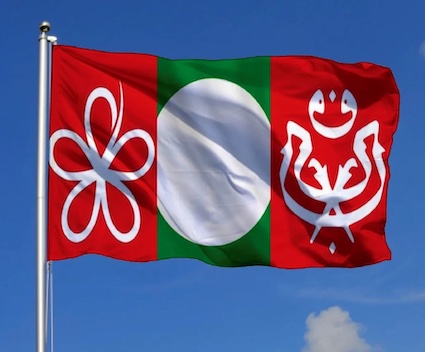IT’S JUST POLITICS: Divorce, political style

Philip Golingai, The Star
“BERSATU teguh, bercerai roboh (together we stand, divided we fall)”.
This describes a brief history of Parti Pribumi Bersatu Malaysia, according to Prof Shamsul Amri Baharuddin, director of the Institute of Ethnic Studies, Universiti Kebangsaan Malaysia
“The proverb encapsulates the evolution and the eventual possible ending of Bersatu,” he said when we met for dinner on Friday.
Prof Shamsul explained that Bersatu was made of fragments at every stage of its formation beginning in 2017. The party, he said, was created by Tun Dr Mahathir Mohamad as a means for him to rejoin politics which he actively left when he quit as Prime Minister in 2003.
“He left politics for 15 years, then he used his name and political influence to get back into power. He was selling himself, and it was a successful sale because the people did not trust Umno then.”
He came in as a “good guy”, the professor said, and DAP advisor and long-time adversary Lim Kit Siang forgot that Dr Mahathir might not be that.
“His ‘superpower’ led to the Opposition winning (the Federal government) for the first time in Malaysian history.
And Pakatan Harapan had to allow a party with only 13 Parliamentary seats to run the whole country and dominate Pakatan.
For Prof Shamsul, Bersatu was only a temporary entity to bring together politicians to run the country. He noted that the party began to struggle after Bersatu chairman Dr Mahathir quit as Prime Minister in March 2020 and Bersatu president Tan Sri Muhyiddin took over the No.1 job in the country.
According to him, under Muhyiddin, Bersatu had three “fragments”: 1) The original Bersatu leaders minus politicians like Dr Mahathir and Datuk Seri Mukhriz Mahathir who formed Pejuang after they were sacked from the party.
2) The 15 Umno MPs who joined the party when Dr Mahathir was Prime Minister, such as party secretary-general Datuk Seri Hamzah Zainudin.
3) The 11 PKR MPs who were led by Datuk Seri Azmin Ali into Bersatu.
“Bersatu (Malay for “united”) was a slogan for those in the party who were in it together. But it was not berpadu (solidly together). So in reality, Bersatu was not bersatu,” the professor said.
According to Prof Shamsul, in the Perikatan Nasional government, which ruled for 17 months, Bersatu was supported by Umno and PAS, which gave it an illusion of teguh (strong or unshakeable).
“The word ‘bersatu’ gave the impression that the party was ‘teguh’. But Prime Minister Muhyiddin was whacked left, right and centre because of his management of the Covid-19 pandemic and the lockdown.
“Muhyiddin’s government was not teguh as he was not able to convince the public that his plan to solve Covid-19’s challenges was working,” he said.
Prof Shamsul pointed out that Muhyiddin’s forced resignation as prime minister was the beginning of the “bercerai” (divorce/split) phase. The Bersatu president could no longer command loyalty as he did not have power.
While Muhyiddin did receive a position after stepping down as PM, National Recovery Council chairman was considered a powerless one.
“The moment Muhyiddin was no longer PM, some politicians and parties started to think that they don’t want to remain ‘married’ to Bersatu and thoughts of bercerai began.
“I believe the Sabah polls (in September 2020) was the beginning of the cerai move, as Umno leaders (such as former Prime Minister Datuk Seri Najib Razak) were complaining about Bersatu and Muhyiddin.
“This fight between Umno and Bersatu has yet to be resolved,” he said.
Then came the Melaka polls in November 2021. Prof Shamsul this is when the divorce between Umno and Bersatu began, when Umno/Barisan Nasional contested against Bersatu/Perikatan Nasional: “Umno and Bersatu contested against each other and Umno won. It was apparent that the two parties had bercerai.”
The professor observed that, internally, Bersatu has bercerai, with the possibility of Hamzah returning to Umno and Azmin forming a new party. Bersatu might be left with Muhyiddin alone, he predicted.
In the lead up to the upcoming Johor polls, Prof Shamsul contends that Bersatu is now rather obviously falling apart (roboh).
“One assemblyman after another is leaving,” he said, referring to incumbent Puteri Wangsa assemblyman Mazlan Bujang and incumbent Larkin assemblyman Datuk Mohd Izhar Ahmad who quit the party to support Umno.
The Johor elections will answer whether Bersatu will roboh completely, noted Prof Shamsul.
“Bersatu might not win a single state seat. Even Muhyiddin gave up his Gambir seat because he knew he would lose there. I suspect he is also going to lose his Pagoh parliamentary seat,” he said, referring to the 15th General Election that many are predicting will happen this year.
“If Bersatu roboh in the Johor polls, Bersatu and Perikatan will not have a way to survive. They might have the money – look at the Melaka polls – but they don’t have the support.”
Bersatu started as “bersatu” and “teguh”, moved into a “bercerai” period but will it end up “roboh” completely?

